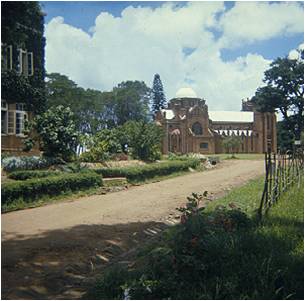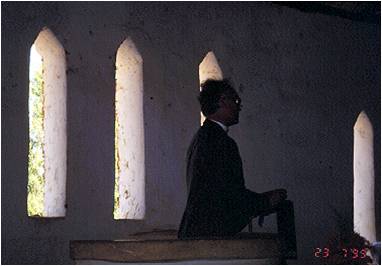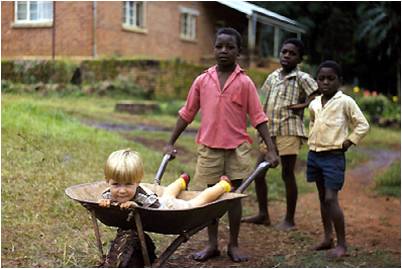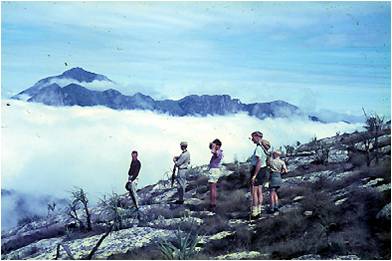While in Malawi we met a BBC crew including the presenter Neil Oliver who presents the Coast series.
They were there to film a documentary on David Livingstone. It is part of a series called ‘The Last Explorers’. I knew that the BBC were about because I know people they were interviewing. At the time that they were in Blantyre I happened to be looking for people travelling from Malawi to the UK to help to deliver some letters from pupils at HHI Primary School in Malawi to their ‘link’ school in Elie, Scotland.
Approaching a suspicious looking group of characters outside of St Michael and All Angel’s I asked if they were from the BBC. Very helpfully they very gladly agreed to take the letters from the Malawian pupils and drop them in the post the minute they landed at London Heathrow. We did however then have to rush and speed up the final stages of the gathering of the letters.
The documentary that they produced will be broadcast on BBC 1 Scotland tomorrow (Thursday) evening. I will be interested to see what they say. Over the last year or two I have been reading quite a bit of history on Malawi. This was partly motivated by my love of Malawi but also my personal history. It was also motivated by me being stung by a couple of different (and in my view ignorant) comments about Malawi. The problem was that I did not have enough history myself at the time to respond properly.
 St Michael’s where I bumped into the BBC crew in 2011. This photo was taken in the 60s or 70s. Sharp eyed readers looking at the HHI building will see that this photo is the wrong way around.
St Michael’s where I bumped into the BBC crew in 2011. This photo was taken in the 60s or 70s. Sharp eyed readers looking at the HHI building will see that this photo is the wrong way around.David Livingstone of course was the founder of the 150 year (so far) relationship between Scotland and Malawi. [Actually, I am sure that some would say that God founded the relationship]. The Church of Scotland mission in Blantyre was the direct heir of his work in the southern (and most populous) region of Malawi. That mission of course then handed over responsibility and Scottish mission became African church. The handover of administrative authority from Scottish missionaries to Malawian ministers was therefore a fundamental milestone and ‘bearing fruit’ of Livingstone’s original missionary work. The relationship between The Church of Scotland and the new Church of Central Africa Presbyterian (CCAP) church continued and Scottish missionaries continued to be sent to work under the authority of the CCAP. Now, the full-time missionary links are much smaller. Instead there are many more links between wider Scottish and Malawian groups and society. However, the Church of Scotland does have a doctor (not Scottish) working for the CCAP at Mulanje Mission Hospital (where one of my brothers was born). In general however, I find that Malawians in the CCAP ask ‘where have all the Scots gone’. Rightly, the CCAP has many other international links now.
 My father, Rev Howard Taylor, preaching at Masalema Church in Chichewa in the 1970s. My father requested a congregation where no one spoke English – to force himself to learn Chichewa.
My father, Rev Howard Taylor, preaching at Masalema Church in Chichewa in the 1970s. My father requested a congregation where no one spoke English – to force himself to learn Chichewa.My father was one of the last Church of Scotland missionaries who worked full-time as a Chichewa speaking minister. Actually, in speaking to my dad now we think he was the last in that category.
Of course the Scottish mission and missionaries went through their ups and downs – to say the least. There is quite an extraordinary history with the full range of human interest and political sagas. At its best the Scottish missionaries were immersed in the language and culture of the people. They avoided imposing and had a clear vision of Malawi as a place that would take the bible and modern education and work out their own fully African and truly indigenous Christian civilisation. At their worst some Scottish missionaries were aloof and arrogant and somewhat ‘colonial’ in their style. [This is not an ‘anti-colonial’ comment by me – it is true that British protection played a key role in the defeat of the slave trade and the emergence of the nation].
At their best in the early days we had DC (David) Scott and Alexander Heatherwick. In the final years my father was, we think, the last Church of Scotland missionary working as a fluent and expert Chichewa speaking minister with congregations in the villages. If someone can correct me on that point I would be glad to hear about it and make the necessary correction. Until that point I will bask in the glory of being a child of that great legacy. Unfortunately this proud ‘achievement’ will be appreciated by no one really other than myself.
 These are Rev Chinthali’s children (and me in the wheelbarrow). They were our neighbours in Zomba. Their father taught my father Chichewa. Their house in the background is now occupied by Rev Kadawati’s family. It was Rev Kadawati, while General Secretary, who welcomed us to return to Malawi.
These are Rev Chinthali’s children (and me in the wheelbarrow). They were our neighbours in Zomba. Their father taught my father Chichewa. Their house in the background is now occupied by Rev Kadawati’s family. It was Rev Kadawati, while General Secretary, who welcomed us to return to Malawi.Being serious again my father did say that his approach as a minister in the CCAP was to say that he was under the authority of the domestic church. Over the last eight months in Malawi I and my family have certainly benefitted from the continuing good will directed towards my father. Recently an older minister came up to me and told me that my father in the synod was just like his Malawian colleagues – as one of them rather than being a bit ‘other’ like most westerners in Malawi. He is remembered by many with great affection.
 A final vintage photo for you. This one Mulanje Mountain in the 1960s. There is more to Malawi than history.
A final vintage photo for you. This one Mulanje Mountain in the 1960s. There is more to Malawi than history.So, these are my roots in a way. There may not be a blood line running down the decades of the Scotland – Malawi relationship. However, the bond between the two countries is deep and lies at the heart and foundation (not to mention geographical shape) of the Malawian nation. The relations between the two countries is wide and shallow (that is not a criticism) in many ways, as anyone who looks at the number of projects going on will be able to tell.
In the future I would like to show people around Malawi and explore in person and on the spot, the trail of David Livingstone. The history is fascinating, the oral traditions and passed down memory are there in the villages and the scenery is beautiful and stunning.

.jpeg&w=60&q=100&h=60)




.jpeg&w=60&q=100&h=60)





